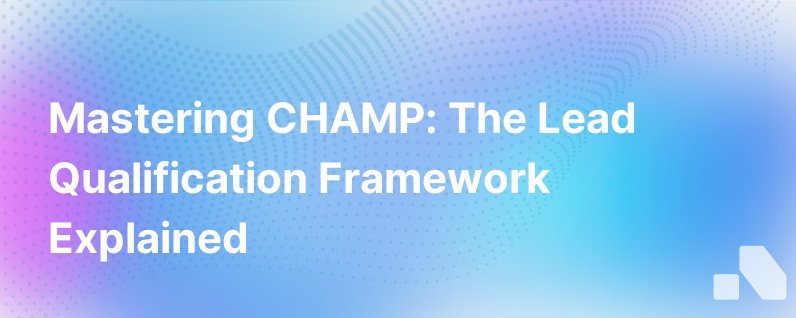
In the intricate dance of B2B sales, understanding the rhythm of your potential customer - their needs, their timing, their decision-making process - is pivotal to success. In this performance, lead qualification frameworks are the choreographers. They help sales professionals identify leads worth pursuing, anticipate their moves, and align solutions to their unique business realities. Enter CHAMP, a lead qualification framework designed to put the focus squarely on the prospect's challenges, ensuring a more customer-centric approach to sales engagements.
Understanding CHAMP
CHAMP is an acronym standing for Challenges, Authority, Money, and Prioritization. These four components reflect a modern shift in sales thinking, moving away from seller-centric methods and towards a more buyer-focused approach. The typical ABC (Always Be Closing) attitude is set aside. Instead, sales professionals using CHAMP seek to "Always Be Helping," providing value based on a deep understanding of the prospect's needs.
Challenges
The starting point of CHAMP is identifying the top challenges your prospect faces. This involves engaging the prospect in conversations to uncover pain points, hurdles, and areas where they're seeking improvements. By defining these challenges early on, sales professionals can tailor their communication and proposals to speak directly to how their product or service can address these specific issues.
Authority
Once the challenges are clear, it's crucial to understand the Authority structure within the prospect's organization. Who are the decision-makers, and how do decisions get made? Are there influencers or gatekeepers involved? Understanding the authority landscape helps in crafting a message that resonates with the right people, and it prevents wasted time pitching to those without the power to say "yes."
Money
Money, or budget, is about ensuring the prospect has the financial resources to invest in a solution. Unlike other frameworks that start with budget, CHAMP introduces money conversations later, after the groundwork of rapport and relevance has been established. This order encourages relationship building and helps to determine if a solution's value can justify or even expand a prospect's budget.
Prioritization
Finally, Prioritization assesses where your solution stands in the prospect's hierarchy of needs. Is the challenge you solve urgent? How does it compare to their other initiatives? Understanding this helps in forecasting sales cycles and determining what it will take to move your solution up the ladder of importance.
Why CHAMP Over Other Frameworks?
Lead qualification frameworks are not one-size-fits-all. Traditionally, models like BANT (Budget, Authority, Needs, Timing) led the way. However, as sales environments evolve, the rigidity of BANT began to show cracks, particularly in its tendency to put the seller's need to close a deal before the buyer's need to solve a problem. CHAMP was born out of the need to realign these priorities.
Moreover, in the BANT framework, many prospects could be disqualified prematurely based on budget alone, potentially missing opportunities to engage clients who could find the budget for a perfectly fitting solution. CHAMP's focus on challenges first allows for value-building conversations that, when executed effectively, make budget a secondary concern.
Implementing CHAMP: A Walkthrough
Let's explore how sales teams can adopt and execute the CHAMP framework with potential leads:
-
Kickoff With Challenges: Begin with discovery calls or meetings focused on understanding the lead’s current hurdles. Frame questions around their processes and where they foresee needing help. The objective is to guide them to articulate their challenges and set the stage for a solutions-based dialogue.
-
Identify the Authority: The next step is to map the organization's hierarchy, clarifying roles and responsibilities. This is also the time to establish relationships with relevant personnel and understand the company's decision-making process.
-
Discuss Money Carefully: With a clear idea of the challenges and decision-making power, broach the subject of budget. The conversation about money should be navigated delicately, ensuring that it aligns with the value you can provide and the urgency of their challenges.
-
Gauge Prioritization: Assess how critical it is for the prospect to alleviate the challenges you've discussed. This helps in tailoring your pitch, timing your approach correctly, and setting realistic expectations for the sales process.
Leveraging Technology in CHAMP
Advances in customer relationship management (CRM) software and data analytics tools can greatly enhance the CHAMP process. A platform such as Aomni harmonizes with CHAMP by offering AI-driven insights that help sales teams understand and anticipate customer needs, automate the gathering of critical information about authority structures, and provide data-driven recommendations on how to best approach conversations about money and prioritization.
Best Practices When Using CHAMP
For optimal results with CHAMP:
- Train Your Team: Ensure that your sales team deeply understands each element within the CHAMP framework and its correct application.
- Practice Active Listening: A CHAMP-centric conversation involves more listening than talking. Understand before trying to be understood.
- Document Insights: Utilize a CRM system to record and analyze the intelligence gathered through CHAMP.
- Stay Agile: Be ready to navigate the conversation flexibly based on the information you receive. The CHAMP framework isn't linear and might require a non-sequential approach.
Conclusion
CHAMP is a nuanced and adaptable framework that compels sellers to lean into a mindset of service to the buyer. It champions a more consultative selling style, prioritizing the customer's voice and empowering sales professionals to guide conversations towards tailored value propositions.
In a crowded and competitive marketplace, frameworks like CHAMP that emphasize customer needs and foster meaningful engagement are becoming increasingly crucial. And with advanced AI platforms like Aomni supporting these frameworks, B2B sales teams can now approach account planning and lead qualification with unprecedented efficiency and empathy.